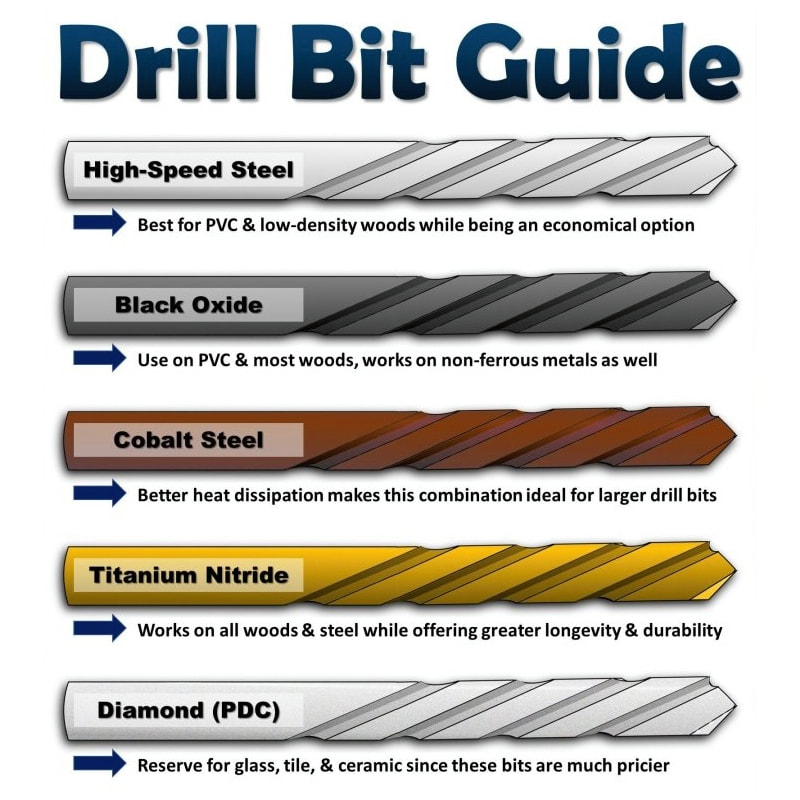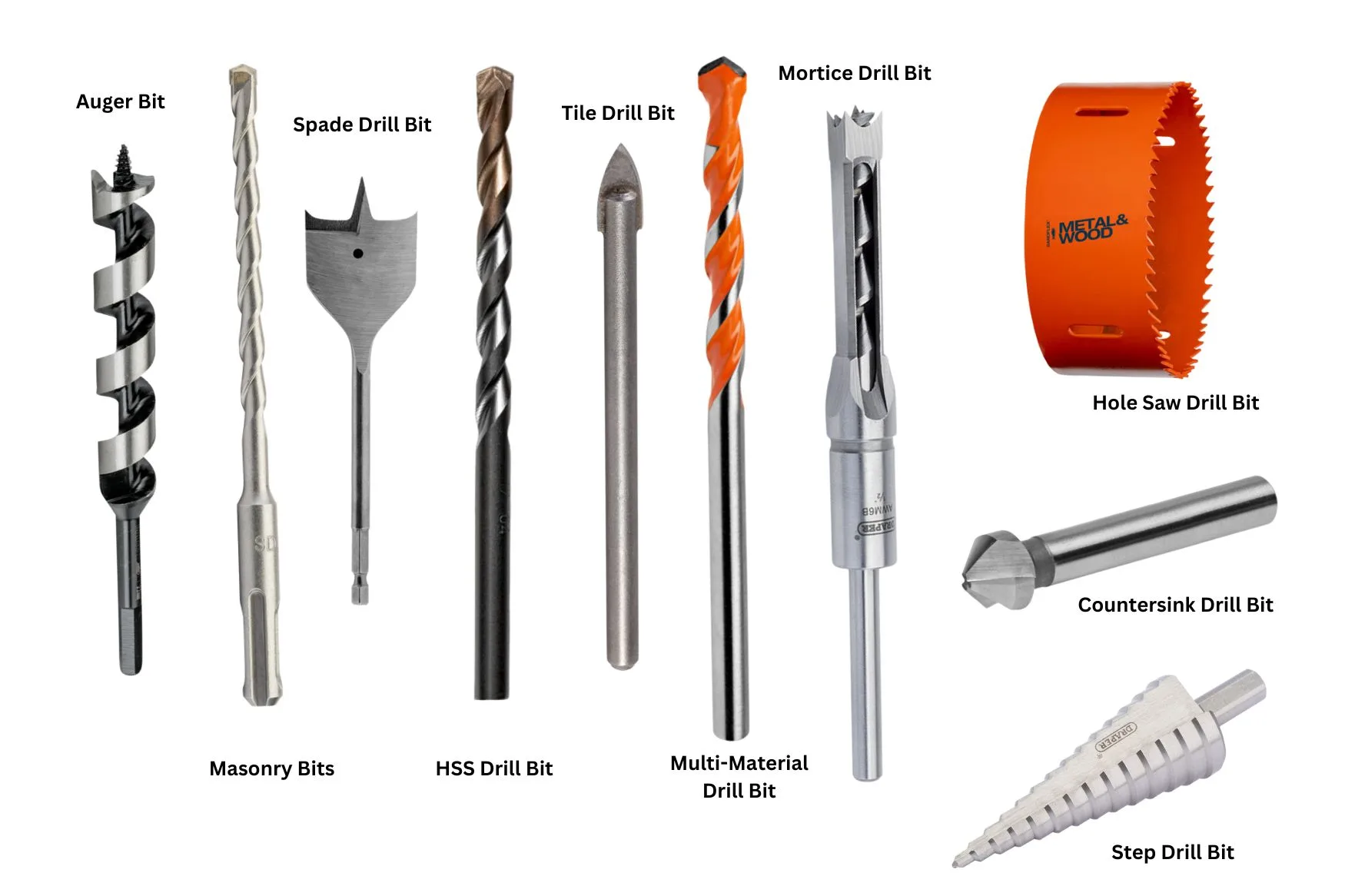Choosing the right drill bit can make all the difference in your project’s success. If you’ve ever struggled with a bit that just won’t cut through or leaves a messy hole, you know how frustrating it can be.
You want your work to be smooth, precise, and efficient—no wasted time or damaged materials. But with so many types of drill bits out there, how do you know which one to pick for wood, metal, tile, or concrete? Keep reading, and you’ll discover exactly which drill bit works best for each material, helping you get the job done right every time.
Credit: gtse.co.uk
Article Summary
Choosing Drill Bits By Material
Choosing the right drill bit for your project depends mainly on the material you plan to drill. Different materials need different types of drill bits to make clean holes without damage. Using the wrong bit can ruin your work or wear out the bit fast.
Each drill bit is made for specific materials like wood, metal, or masonry. Knowing which bit fits your material helps you work faster and safer. This guide shows you the best drill bit types for common materials.
Wood Drill Bits
Wood drill bits often have a sharp point at the tip. This point helps start the hole without slipping. Spade bits and auger bits are popular choices for wood. They remove wood chips quickly and make smooth holes. Use these bits for soft and hard wood.
Metal Drill Bits
Metal drill bits are made from high-speed steel or cobalt. They stay sharp even with tough metals. These bits have a small angle at the tip to cut through metal cleanly. Use cutting oil to cool the bit and prevent damage.
Masonry Drill Bits
Masonry drill bits have a tip made of carbide. This helps drill into hard materials like brick, stone, and concrete. The tip is strong and wears slowly. Use these bits with a hammer drill for best results.
Plastic Drill Bits
Plastic drill bits have a sharp, pointed tip to avoid cracking. They cut clean holes without melting the plastic. Use slow speed to keep the plastic cool and prevent damage.

Credit: www.manxeon.com
Drill Bits For Wood
Choosing the right drill bit for wood is important. Wood is soft compared to metal or concrete. Different bits make drilling easier and cleaner. Some bits work better for smooth holes. Others cut deep and fast. Understanding the main types helps you pick the best one for your project.
Spade Bits
Spade bits have a flat, paddle-shaped tip. They cut large holes quickly. These bits are good for rough work. Use them to drill holes for wires or pipes. They work best with soft or hardwood. Spade bits leave a rough edge, so sanding might be needed.
Brad Point Bits
Brad point bits have a sharp point in the center. This point keeps the bit from slipping. They create clean, precise holes. These bits are perfect for fine woodworking. Use them for drilling furniture or cabinets. Brad point bits make less tear-out on the wood surface.
Auger Bits
Auger bits have a screw tip that pulls the bit into the wood. They drill deep, clean holes easily. These bits work well for thick wood pieces. Auger bits are strong and durable. They help in making holes for dowels or large fasteners.
Drill Bits For Metal
Drilling into metal requires the right drill bit for a clean and precise hole. Metal is hard and dense, so it needs strong, sharp bits. Choosing the correct bit helps avoid damage and extends tool life. Here are some common types of drill bits used for metal.
High-speed Steel Bits
High-Speed Steel (HSS) bits are popular for metal drilling. They stay sharp and resist heat well. These bits work best on soft metals like aluminum and mild steel. HSS bits are affordable and easy to find. They suit most home and workshop projects.
Cobalt Bits
Cobalt drill bits are made from a blend of steel and cobalt. They handle high heat better than HSS bits. These bits cut through tough metals like stainless steel and cast iron. Cobalt bits last longer but cost more. They are a good choice for heavy-duty metal drilling.
Titanium-coated Bits
Titanium-coated bits have a thin layer of titanium on HSS bits. This coating reduces friction and increases durability. They drill metal faster and stay sharper longer than plain HSS bits. Titanium-coated bits work well on soft to medium metals. They are a good upgrade for frequent metal drilling.
Drill Bits For Masonry
Drilling into masonry requires special drill bits made for hard materials. Masonry includes bricks, concrete, stone, and mortar. Regular drill bits can wear out quickly or break on these surfaces. Using the right drill bit saves time and effort. It also protects your tools and work surface.
Carbide-tipped Bits
Carbide-tipped bits are tough and durable. They have a hard carbide tip that cuts through bricks and concrete. These bits stay sharp longer than steel bits. They work well for small to medium holes in masonry. Use them with a hammer drill for best results. Carbide tips handle the heat and pressure of masonry drilling.
Sds Drill Bits
SDS drill bits fit into SDS drills designed for heavy work. They have a special shank that locks into the drill. This design gives better power and control. SDS bits can drill larger holes faster than regular bits. They are perfect for concrete and stone. Use SDS bits for tough jobs and repeated drilling in masonry.
Drill Bits For Plastic
Plastic is a common material in many projects. Drilling into plastic requires care to avoid cracking or melting. Choosing the right drill bit helps make clean holes without damage. Different bits work better for various plastics and hole sizes. Understanding the best bit type improves your work and saves time.
Standard Twist Bits
Standard twist bits are the most common choice for plastic. They have a sharp point and spiral edges. These bits cut smoothly through soft and hard plastics. Use a slow drill speed to prevent melting. Keep steady pressure to avoid cracks. They work well for small to medium holes.
Step Drill Bits
Step drill bits have a cone shape with different diameters. They create holes of many sizes without changing bits. Step bits make clean, round holes in plastic sheets. These bits reduce the risk of cracking thin plastic. Use a moderate speed and steady pressure. Step bits are ideal for larger holes or thin plastic panels.
Specialty Drill Bits
Specialty drill bits are designed for tasks that require precision and care. These bits handle unique materials and shapes that standard bits cannot. Using the right specialty bit makes drilling easier and protects your material from damage.
Glass And Tile Bits
Glass and tile bits have a sharp, pointed tip. They cut through hard, brittle surfaces without cracking. These bits work best at low speed. Use water to cool the bit and reduce heat. This keeps the glass or tile safe from breaking.
Forstner Bits
Forstner bits create clean, flat-bottomed holes in wood. They are perfect for making large holes or overlapping holes. These bits drill smoothly without splintering the wood. Use a drill press or steady hand for best results.
Hole Saws
Hole saws cut large, round holes in wood, metal, or plastic. They have a circular blade with teeth that cut the material. Hole saws are ideal for door hardware or pipe fittings. Keep the drill steady and use moderate speed for clean cuts.
Tips For Drill Bit Maintenance
Drill bits need care to work well and last long. Good maintenance saves money and effort. It keeps bits sharp and safe to use. Follow simple tips to keep your drill bits in top shape.
Sharpening Techniques
Sharpen drill bits to keep them cutting clean. Use a bench grinder or sharpening tool. Hold the bit steady and follow the original angle. Avoid overheating the bit to keep it hard. Check edges often and sharpen as needed.
Proper Storage
Store drill bits in a dry place to stop rust. Use a case or holder to keep bits organized. Keep bits separate to avoid damage. Label storage for easy bit selection. Regularly clean bits before putting them away.
Safety Practices
Wear safety glasses while sharpening or using drill bits. Keep fingers away from the rotating bit. Use clamps to hold workpieces steady. Inspect bits for cracks or damage before use. Replace worn or broken bits immediately to avoid accidents.
Matching Drill Speed And Pressure
Matching drill speed and pressure is key to efficient drilling. It keeps the drill bit sharp and avoids damage to materials. Different materials need different speeds and pressure levels. Using the wrong settings can cause the bit to overheat or break.
Understanding how to adjust speed and pressure helps you work faster and safer. It also improves the quality of the hole you drill.
Drilling Into Wood
Wood is soft, so use a high drill speed. This helps cut through quickly without tearing. Apply light to medium pressure. Too much pressure can crack the wood or dull the bit fast.
Drilling Into Metal
Metal is tough and needs slower speeds. Slower speed prevents the bit from overheating. Use steady, firm pressure, but do not force the drill. Let the bit do the work to avoid damage.
Drilling Into Masonry
Masonry requires a slow to medium speed setting. Use a hammer drill for best results. Press firmly but carefully. Excessive pressure can break the bit or the material.
Drilling Into Plastic
Plastic needs a medium to high speed. Too slow speed can melt the plastic. Use light pressure to avoid cracking or deforming the material.

Credit: www.redboxtools.com
Frequently Asked Questions
What Drill Bit Works Best For Wood Projects?
Wood requires high-speed steel (HSS) or brad point bits. These bits offer clean cuts and prevent splintering. They ensure smooth holes for screws or dowels. Choose the right size for your project to avoid damaging the material.
Which Drill Bit Should I Use For Metal Surfaces?
Use cobalt or titanium-coated drill bits for metal. These bits are heat-resistant and durable. They maintain sharpness during tough drilling. Always use cutting oil to reduce friction and prolong bit life.
Can I Use Masonry Bits On Concrete And Brick?
Yes, masonry bits are designed for concrete, brick, and stone. They have carbide tips for effective drilling. Use a hammer drill setting for best results. Avoid using regular bits to prevent damage or poor performance.
What Type Of Drill Bit Is Suitable For Plastic?
For plastic, use standard twist drill bits or spade bits. Drill at low speed to avoid melting. Applying masking tape on the surface prevents cracking. Choose sharp bits to ensure clean, precise holes.
Conclusion
Choosing the right drill bit makes your work easier and safer. Different materials need specific bits to avoid damage. Wood, metal, and masonry each require unique drill tips. Using the wrong bit can cause poor results or break tools. Keep your bits sharp and clean for best performance.
Remember these tips to pick the correct drill bit every time. This knowledge helps you complete projects with confidence and accuracy. Simple choices lead to better and faster drilling results.